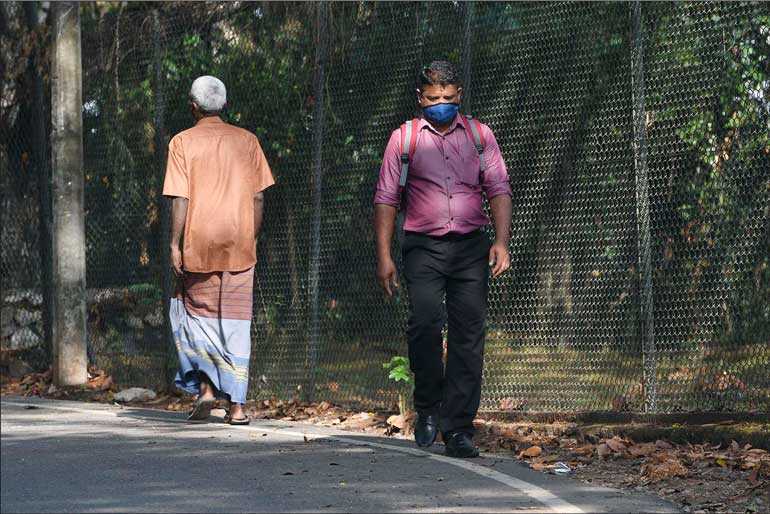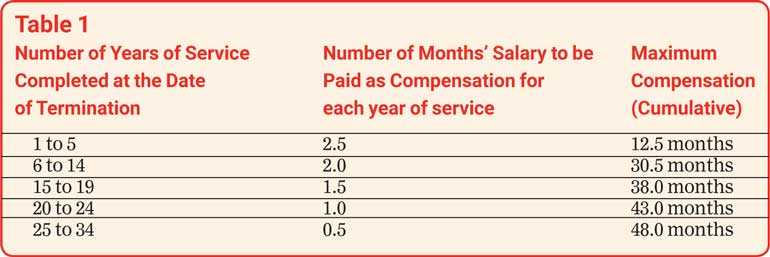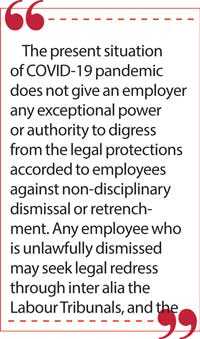Monday Feb 23, 2026
Monday Feb 23, 2026
Thursday, 9 April 2020 00:00 - - {{hitsCtrl.values.hits}}


The COVID-19 pandemic is placing gargantuan pressure and stress on businesses and thereby the economy, as State-wide lock-downs and curfew in several countries of the world has disrupted  businesses. Consequently, several businesses are facing severe financial challenges which is mounting as the pandemic has paralysed the functioning and progress of businesses, and thereby forcing the businesses to consider serious cost cutting measures. It is reasonably foreseeable that many businesses shall endeavour to retrench employees in order to cut down costs.
businesses. Consequently, several businesses are facing severe financial challenges which is mounting as the pandemic has paralysed the functioning and progress of businesses, and thereby forcing the businesses to consider serious cost cutting measures. It is reasonably foreseeable that many businesses shall endeavour to retrench employees in order to cut down costs.
In a country where employment is rigorously protected by law, retrenchment cannot be a simple tread for the employers. On the other hand, it is crucial for the employees to understand and appreciate the protection accorded to them by law. This note shall briefly highlight the laws pertaining to retrenchment in Sri Lanka.
What is retrenchment of employees?
Retrenchment is a type of dismissal of an employee for non-disciplinary reasons, and due to no fault of the employee. The Industrial Disputes Act1 defines “retrenchment” as “the termination by an employer of the services of a workman or workmen on the ground that such workman or workmen is or are in excess of the number of workmen required by such employer to carry on his industry”2.
Is an employer entitled to retrench?
It is well established in law that a person cannot be compelled to continue a business or a section of it, which he, for his own reasons intends to stop or is not willing to continue3. Furthermore, it is within the employer’s purview and discretion to decide the size of its labour force, and may make bona fide decisions in determining the necessary work force and to retrench excess employees. As a consequence, the employer may retrench employees who were employed in that business or section. The decision to discontinue a business or a section of it, or to reduce the size of the work force is within the purview and discretion of the management and the management cannot be called into question as long as the said decision is not made in mala fide in order to victimise the employees.
However, Sri Lankan law does not permit for the freedom of “hire and fire”, and therefore any retrenchment decision is subject to the laws governing employment and the termination of it.
What are the laws governing retrenchment of the employees?
In Sri Lanka, Part IVB of the Industrial Disputes Act (IDA)4, and Termination of Employment of Workmen (Special Provisions) Act (TEWA)5 govern the laws pertaining to retrenchment of employees.
Provisions of TEWA and Part IVB of the IDA does not apply to employers who employee on average  less than 15 employees6.
less than 15 employees6.
For employees who are governed by TEWA, the provisions of TEWA apply and the provisions in Part IVB of the IDA does not apply7. For employees who are not governed by the provisions of TEWA, Part IVB of the IDA applies.
It is noteworthy that neither TEWA nor the provisions under the IDA apply to persons employed by the Government. However, Part IVB IDA is applicable to the employees of public corporations.
Under TEWA, how can an employer retrench their employees?
Section 2 (1) of TEWA categorically states that no employer shall terminate the scheduled employment of any workman without the prior consent in writing of the workman; or the prior written approval of the Commissioner General of Labour.
The Commissioner is authorised to permit or refuse to approve the retrenchment, however, is required to make the decision within three months from the date of receipt of the application from the employer8. The Commissioner is also entitled to decide on approving the retrenchment subject to any terms and conditions, especially terms and conditions related to payment of compensation and gratuity to the employees who are retrenched9.
What is “scheduled employment” under TEWA and to whom does TEWA apply?
According to section 19 of the TEWA “scheduled employment” means employment in –
(a) any trade, in respect of which a notification has been published in the Gazette under subsection (2) of section 6 of the Wages Boards Ordinance of an order made under subsection (1) of that section and shall include the work of any worker referred to therein but excluded from the provisions of such order;
(b) every shop and every office within the meaning of the Shop and Office Employees (Regulation of Employment and Remuneration) Act; or
(c) every factory within the meaning of the Factories Ordinance;
Section 3(1) of the TEWA lists out the employees to whom TEWA doesn’t apply:
3. (1) The provisions of this Act, other than this section, shall not apply –
(a) to an employer by whom less than fifteen workmen on an average have been employed during the period of six months preceding the month in which the employer seeks to terminate the employment of a workman; or
(b) to the termination of employment of any workman who has been employed by an employer for a period of less than one hundred and eighty days inclusive of-
(i) every day of absence on any ground approved by the employer;
(ii) every day of absence due to any injury to the workman caused by an accident arising out of, and in the course of his employment;
(iii) every day of absence due to anthrax or any occupational disease specified in Schedule III of the Workman’s Compensation Ordinance (Chapter 139);
(iv) every day on which the employer fails to provide work for the workman;
(v) every day of absence due to a lockout, or strike that is not illegal, if such days do not in the aggregate exceed thirty days; and
(vi) every holiday or day of absence from work to which a workman is entitled, by or under, the provisions of any written law,
in the continuous period of twelve months commencing from the date of employment if such termination takes place within that period of twelve months; or
(c) to the termination of employment of any workman who has been employed by an employer where such termination was effected by way of retirement in accordance with the provisions of –
(i) any collective agreement in force at the time of such retirement; and
(ii) any contract of employment wherein the age of retirement of such workman is expressly stipulated; or
(d) to the Government in its capacity as an employer; or
(e) to the Local Government Service Commission in its capacity as an employer; or
(f) to any local authority in its capacity as an employer; or
(g) to any co-operative society in its capacity as an employer; or
(h) to any public corporation in its capacity as an employer; or
(i) to the termination of employment of any workman who has been employed by an employer in contravention of the provisions of any law for the time being in force.
This means, practically TEWA applies to most of the private sector employees. However, it is also noteworthy that TEWA does not apply to probationers.
Under TEWA, what are the consequences of retrenching employees without their consent, or without the approval of the Commissioner General of Labour? What is the consequence of acting in contravention of the decision of the Commissioner General of Labour?
Any dismissal from employment in contravention of the provisions of TEWA shall be illegal, null and void, and accordingly shall be of no effect10.
Where the written approval of the Commissioner is sought by the employer, and the Commissioner has made a decision, any person failing to comply with the said decision shall be guilty of an offence punishable by a fine not exceeding one thousand rupees and/or imprisonment for a term not exceeding six months11.
Can a decision made by the Commissioner General of Labour be challenged before any other forum?
Section 2(2)(f) of TEWA explicitly provides that any decision made by the Commissioner is final and conclusive and can not be called in question whether by way of a writ or otherwise in any court; or in any court, tribunal, or other institution established under the Industrial Disputes Act.
However, a statutory “ouster clause” like the aforesaid provision, will not protect a decision by the Commissioner which is ex facie ultra vires, illegal, and made without or outside any legal authority12. Any administrative action, if it is not in compliance with the statutory provision, then it is not protected by any “ouster clause”. It can be challenged on the basis of jurisdictional errors i.e. excess of jurisdiction, or absence of jurisdiction, or abuse of jurisdiction.
Furthermore, where a decision made by the Commissioner violates the fundamental rights guaranteed by the Constitution, the person affected may seek redress from the Supreme Court13. However, an application pertaining to the violation of fundamental rights must be filed within “one month”14 from the date of the decision.
In the event of the Commissioner ordering to pay compensation to the employees, how is the compensation payable under the provisions of TEWA calculated?
Section 6D of TEWA provides that the Commissioner in consultation with the minister can decide the formula to calculate compensation and publish it in Gazette.
Currently, in accordance with the provisions in Extraordinary Gazette No: 1384/07 of Tuesday, 15 March 2005, the formula to calculate compensation under TEWA is as shown in table 1.
However, the referred Gazette has prescribed the maximum compensation at Rs. 1,250,000.
Under Part IVB of the IDA, how can an employer retrench their employees?
According to the provisions in section 31F of the IDA, unless the retrenchment is done with the consensus of the employee or representative of the workman, the employer must give the workman and, if he belongs to a trade union, such trade union one month’s notice in writing of the intention of retrenchment, and also forward a copy of the same notice to the Commissioner General of Labour.
Generally, the retrenchment is to be completed and brought into effect within two months of the date of such notice15 unless16:
within the aforesaid two months’ period, any industrial dispute which arises between the employer and employee pertaining to the said notice may be referred by the Commissioner General of Labour to conciliation by an authorised officer17, or settlement by arbitration by an arbitrator18, or by the subject Minister to an arbitrator for settlement by arbitration, or to an industrial court for settlement19.
To whom does Part IVB of the IDA apply?
Section 31E(1) provides a list of employers to whom IDA does not apply:
31E. (1) The provisions of this Part shall not apply –
(a) to any employer by whom less than fifteen workmen on an average have been employed for a working day in the month preceding the month in which notice of the intention to effect retrenchment in respect of any workman employed is given by the employer to that workman, or
(b) to any industry which is of a seasonal character or in which work is performed intermittently, or
(c) to the retrenchment of any workman who has been employed in any industry for a period which is less than one year.
Furthermore, section 31E(2) provides that, “where the Minister is of the opinion that the application of this Part to an industry is likely to affect that industry in such a manner as to cause serious repercussions to that industry, the Minister may by Order published in the Gazette declare that this Part shall not apply, or shall apply subject to such conditions as may be specified in that Order, to that industry. Any Order made by the Minister under this subsection shall be placed as soon as practicable before Parliament for approval. Any Order not so approved shall be deemed to have been of no effect”. Hence, it is within the discretion of the Minister to exempt any industry from the provisions of Part IVB of IDA, for the aforesaid reasons.
In addition, it must be reiterated that provisions in Part IVB of the IDA does not apply to employment to which TEWA applies20.
Summary
Employees governed by TEWA can only be retrenched by the employer either with the consent of the employee or the approval of the Commissioner General of Labour.
Part IVB of IDA applies to Employment not covered by TEWA, and such employees can be retrenched by giving one month’s notice of the intention of retrenchment to the employee with copy of the notice sent to the Commissioner General of Labour, and be effected after the expiry of two months from the date of the said notice, unless the dispute is referred to conciliation or arbitration by the Commissioner or to arbitration or industrial courts by the subject Minister.
The present situation of COVID-19 pandemic does not give an employer any exceptional power or authority to digress from the legal protections accorded to employees against non-disciplinary dismissal or retrenchment. Any employee who is unlawfully dismissed may seek legal redress through inter alia the Labour Tribunals, and the Commissioner of Labour
[The writer, LLB (Honours) (UK); LLM (Distinction) (Edin) – Chevening Scholar, is an Attorney-at-Law (Sri Lanka).]
Footnotes
1 Act No 43 of 1950 (as amended)
2 ibid section 48
3 vide Nidahas Karmika Sala Velanda Sevaka Vurtheeya Samithiya Case (ID 35 CGG 11,297 of 11 April 1958), Jaya Bharat Tile Works v State of Madras ([1954] 1 LLJ 286)
4 Act No 43 of 1950 (as amended)
5 Act No 45 of 1971 (as amended)
6 ibid section 3(1)(a), and Section 31E(1)(a) of IDA Act No 43 of 1950 (as amended)
7 ibid section 4
8 ibid sections 2(2)(b), and 2(2)(c)
9 ibid section 2(2)(e)
10 ibid section 5
11 ibid section 2(3)
12 Section 22 of the Interpretation Ordinance No 21 of 1901 (as amended); Anisminic Ltd v Foreign Compensation Commission ([1969] 2 AC 147); Pure Beverages Company Executive Officers Association v Commissioner of Labour ([2001] 2 Sri LR 258).
13 Articles 17 and 126 of the Constitution of the Democratic Socialist Republic of Sri Lanka
14 Article 126(2) of the Constitution of the Democratic Socialist Republic of Sri Lanka
15 Section 31G of the Industrial Disputes Act No 43 of 1950 (as amended)
16 cf. ibid section 31H
17 ibid section 31H(a)
18 ibid section 31H(b)
19 ibid section 31H(c)
20 Section 4 of the Termination of Employment of Workmen (Special Provisions) Act No 45 of 1971 (as amended)